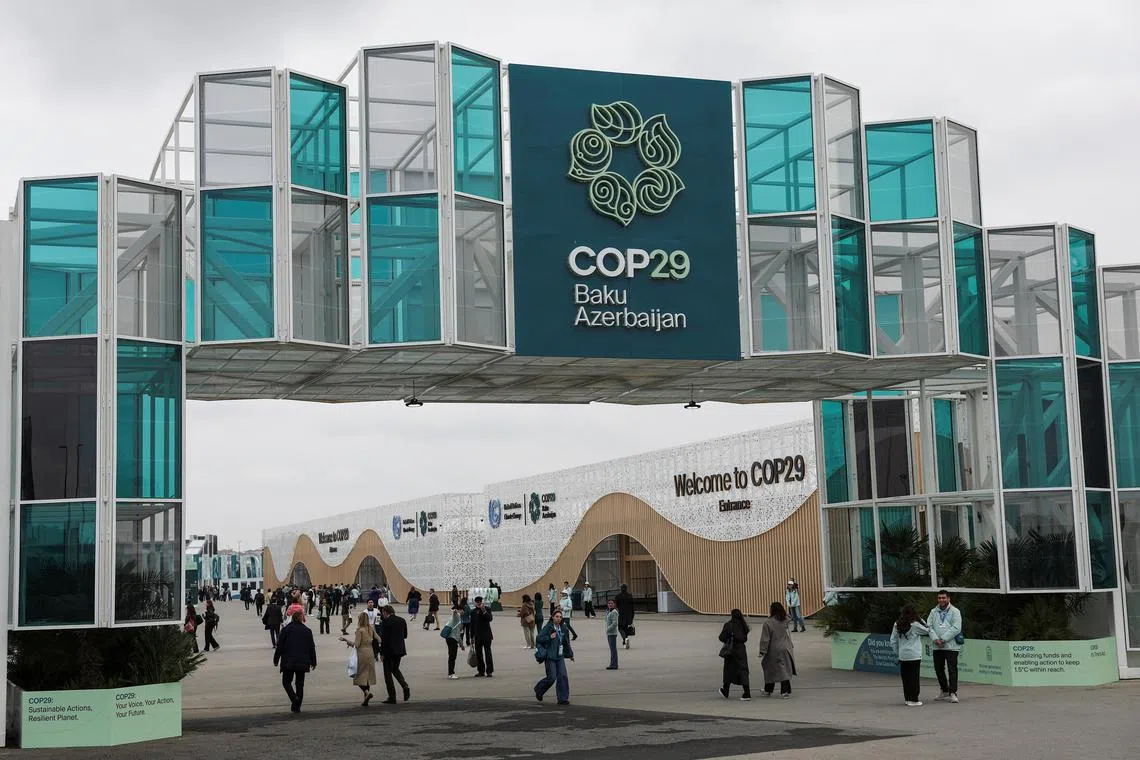World leaders meet for UN climate talks, but big names missing
Sign up now: Get ST's newsletters delivered to your inbox

Just a handful of leaders from the G20 – which accounts for nearly 80 per cent of planet-heating greenhouse gas emissions – are expected in Baku, including UK Prime Minister Keir Starmer.
PHOTO: REUTERS
BAKU - Dozens of world leaders convene in Azerbaijan on Nov 12 for COP29, but many big names are skipping the UN climate talks where the impact of Donald Trump’s election victory is keenly felt.
More than 75 leaders are expected in Baku over two days but the heads of some of the most powerful and polluting economies are not attending the summit.
Just a handful of leaders from the G20 – which accounts for nearly 80 per cent of planet-heating greenhouse gas emissions – are expected in Baku, including UK Prime Minister Keir Starmer.
“This government believes that climate security is national security,” his Energy Secretary Ed Miliband said on X on Nov 11.
US President Joe Biden, Chinese President Xi Jinping, Indian Prime Minister Narendra Modi and French President Emmanuel Macron are among G20 leaders missing from the event, where uncertainty over future US unity on climate action hung over the opening day.
Washington’s top climate envoy sought to reassure countries in Baku that Trump’s re-election would not end US efforts on global warming, even if it would be “on the back burner”.
UN climate chief Simon Stiell also appealed to solidarity, kicking talks off on Nov 11 by urging countries to “show that global cooperation is not down for the count”.
But the opening day got off to a rocky start, with feuds over the official agenda delaying by hours the start of formal proceedings in the stadium venue near the Caspian Sea.
Later in the evening, governments approved new UN standards for a global carbon market in a key step toward allowing countries to trade credits to meet their climate targets.
COP29 president Mukhtar Babayev hailed a “breakthrough” after years of complex discussions, but more work is needed before a long-sought UN-backed market can be fully realised.
Difficult negotiations
The top priority at COP29, however, is landing a hard-fought deal to boost funding for climate action in developing countries.
These nations – from low-lying islands to fractured states at war – are least responsible for climate change but most at risk from rising seas, extreme weather and economic shocks.
Some are pushing for the existing pledge of US$100 billion a year (S$134 billion) to be raised 10-fold at COP29 to cover the future cost of their nations shifting to clean energy and adapting to climate shocks.
Mr Babayev, a former oil executive, told negotiators that trillions may be needed, but a figure in the hundreds of billions was more “realistic”.
Nations have haggled over this for years, with disagreements over how much should be paid, and who should pay it, making meaningful progress next to impossible ahead of COP29.
“These will not be easy negotiations, perhaps the most challenging since Paris,” said Germany’s climate negotiator Ms Jennifer Morgan.
Developing countries warn that without adequate finance, they will struggle to offer ambitious updates to their climate goals, which countries are required to submit by early 2025.
The small group of developed countries that currently contributes the money wants the donor pool expanded to include other rich nations and top emitters, including China and the Gulf states, something firmly rejected by Beijing.
Mr Stiell warned rich countries to “dispense with any idea that climate finance is charity”.
Around 50,000 people are attending summit in Azerbaijan, a petrostate wedged between Russia and Iran, including the leaders of many African, Asian and Latin American countries beset by climate disasters. AFP


